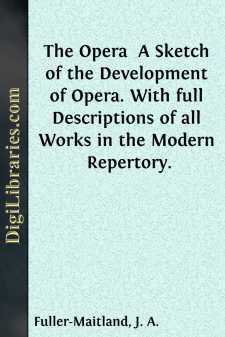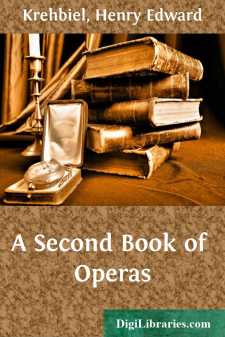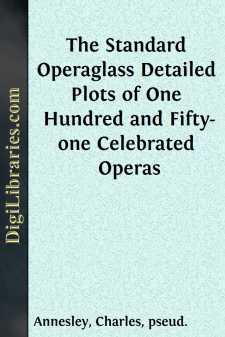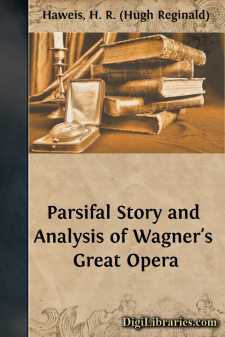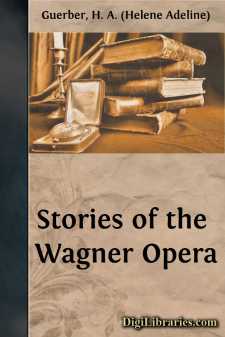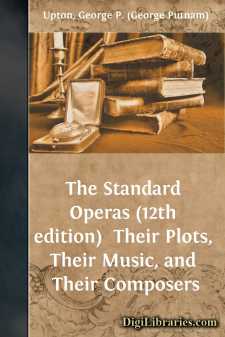Non-Classifiable
- Non-Classifiable 1768
Non-Classifiable Books
Sort by:
If Music be, among the arts, 'Heaven's youngest-teemed star', the latest of the art-forms she herself has brought forth is unquestionably Opera. Three hundred years does not at first seem a very short time, but it is not long when it covers the whole period of the inception, development, and what certainly looks like the decadence, of an important branch of man's artistic industry....
more...
THE EARLY LITURGICAL DRAMA The modern entertainment called opera is a child of the Roman Catholic Church. What might be described as operatic tendencies in the music of worship date further back than the foundation of Christianity. The Egyptians were accustomed to sing "jubilations" to their gods, and these consisted of florid cadences on prolonged vowel sounds. The Greeks caroled on vowels in...
more...
CHAPTER I BIBLICAL OPERAS Whether or not the English owe a grudge to their Lord Chamberlain for depriving them of the pleasure of seeing operas based on Biblical stories I do not know. If they do, the grudge cannot be a deep one, for it is a long time since Biblical operas were in vogue, and in the case of the very few survivals it has been easy to solve the difficulty and salve the conscience of the...
more...
by:
Giuseppe Giacosa
SYNOPSIS The opera is founded on Henri Murger's book "La Vie de Bohème." ACT I Rudolph and Marcel are sitting in the latter's attic-studio in the Quartier Latin, in Paris. Marcel is absorbed in his painting. The day is cold. They have no money to buy coal. Marcel takes a chair to burn it, when Rudolph remembers that he has a manuscript which has been rejected by the publishers and...
more...
by:
Charles Annesley
This little opera, composed by Weber in his early youth and first represented at Dresden under the composer's own direction, for a time fell into utter oblivion, but has lately been reproduced. Though short and unpretending it really deserves to be heard, the music is so full of sweetness, so fresh and pretty. The text is taken from a tale of the Arabian Thousand and One Nights, and though full of...
more...
Page 3 PARSIFAL I The story of the Holy Grail and its guardians up to the moment of Parsifal's appearance upon the scene, is—we gather it from Gurnemanz's rehearsal of his memories to the youthful esquires,—as follows: At a time when the pure faith of Christ was in danger from the power and craft of His enemies, there came to its defender, Titurel, angelic messengers of the...
more...
WAHNFRIED I visited Bayreuth on the 24th of July, 1883, and attended two crowded performances of Wagner's last work, Parsifal. In the morning I went into the beautiful gardens of the Neue Schloss. On either side of a lake, upon which float a couple of swans and innumerable water-lilies, the long parklike avenue of trees are vocal with wild doves, and the robin is heard in the adjoining thickets....
more...
RIENZI, Wagner was greatly troubled in the beginning of his career about the choice of subjects for his operas. His first famous work, ‘Rienzi,’ is founded upon the same historical basis as Bulwer's novel bearing the same name, and is a tragic opera in five acts. The composer wrote the poem and the first two acts of the score in 1838, during his residence at Riga, and from there carried it...
more...
AUBER. Daniel François Esprit Auber, one of the most prominent representatives of the opera comique, was born at Caen, in Normandy, Jan. 29, 1784. He first attracted attention in the musical world by his songs and ballads, written when a mere boy. Young as he was, they were great favorites in French and English drawing-rooms, and their success diverted him from his commercial intentions to that...
more...
by:
Elbert Hubbard
PERICLES When we agreed, O Aspasia! in the beginning of our loves, to communicate our thoughts by writing, even while we were both in Athens, and when we had many reasons for it, we little foresaw the more powerful one that has rendered it necessary of late. We never can meet again: the laws forbid it, and love itself enforces them. Let wisdom be heard by you as imperturbably, and affection as...
more...


